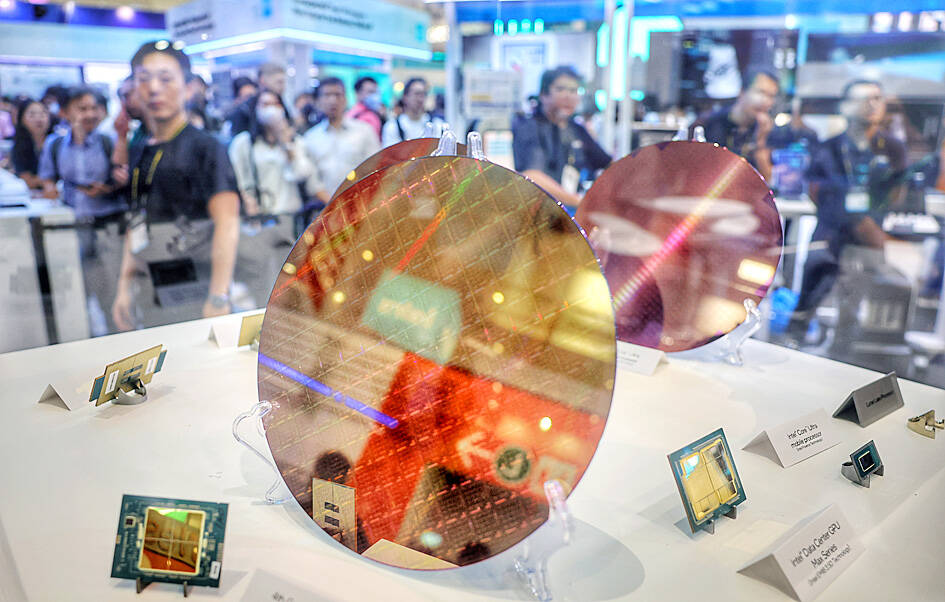Taiwan should collaborate with trusted partners to maintain its edge in advanced semiconductor manufacturing, while also confronting China’s increasing global share of legacy chip production, a panel of experts told a forum in Taipei yesterday.
While Taiwan enjoys a “strong and capable” ecosystem in advanced semiconductor manufacturing, it needs to continue working with global partners to “build up the alliance [and] interconnections,” former US security official Joe Wang said.
Additionally, Taiwan should collaborate with those partners on boosting the production of legacy chips, Wang said, referring to less advanced semiconductors that are used in household appliances and automobiles, among others.

Photo: CNA
Global legacy chipmaking has increasingly become “skewed toward China,” Wang said, adding that the situation was “extremely concerning.”
The Chinese government has subsidized production of legacy chips “in a way that none of the rest of our countries can do,” adding that such an approach was not business-driven, but aimed at expanding Beijing’s political influence, Wang said.
Cooperation between trusted partners is needed to balance China’s competitiveness in manufacturing legacy chips, also known as mature nodes, he added.
Wang, who spoke in his capacity as a senior advisor at the Virginia-based think tank Special Competitive Studies Project, previously served as the US National Security Council’s director for Russia.
His comments echoed those of US Secretary of Commerce Gina Raimondo, who in April said that China was producing about 60 percent of legacy chips in the world and would continue to do so in the coming years.
The surge in Chinese production was partly caused by US-led export bans on advanced chips and chipmaking equipment to China on national security grounds, some observers said.
Sharing Wang’s concerns, Institute of Geoeconomics director Kazuto Suzuki cautioned against complacency and underscored prioritizing the maintenance of “technological superiority.”
“We cannot just sit and relax,” he said.
China was also striving to make advanced chips, despite facing restricted access to those that power artificial intelligence and other cutting-edge technologies, Suzuki added.
Suzuki urged Japan and Taiwan to further explore collaboration opportunities for semiconductor research and development, such as facilitating the exchanges of technologies, ideas and people.
“Friendshoring is not just about production and trade,” he said. “Friendshoring is also about how to share the information, how to share intellectual property [and] how to maintain those movements of people.”
The Japanese expert was alluding to an emerging trend in trade where supply chain networks prioritize countries seen as political and economic partners.
South Korean economist Yeon Won-ho, a member of the South Korean Presidential Office’s policy advisory committee, also called for cooperation between his country and Taiwan, saying that the two were not “competitors,” but were “complementary” to each other.
One key area for possible collaboration between Taiwan and South Korea is information and communication technology services and devices, Yeon said.
This represents an emerging market, Yeon said, particularly as the US government seeks to ban Chinese-made communications and automated driving systems in cars for fear of data collection by Chinese companies.
The forum was co-organized by the Research Institute for Democracy, Society and Emerging Technology, a national think tank established in October last year under Taiwan’s National Science and Technology Council.

Taiwan is stepping up plans to create self-sufficient supply chains for combat drones and increase foreign orders from the US to counter China’s numerical superiority, a defense official said on Saturday. Commenting on condition of anonymity, the official said the nation’s armed forces are in agreement with US Admiral Samuel Paparo’s assessment that Taiwan’s military must be prepared to turn the nation’s waters into a “hellscape” for the Chinese People’s Liberation Army (PLA). Paparo, the commander of the US Indo-Pacific Command, reiterated the concept during a Congressional hearing in Washington on Wednesday. He first coined the term in a security conference last

Prosecutors today declined to say who was questioned regarding alleged forgery on petitions to recall Democratic Progressive Party (DPP) legislators, after Chinese-language media earlier reported that members of the Chinese Nationalist Party (KMT) Youth League were brought in for questioning. The Ministry of Justice Investigation Bureau confirmed that two people had been questioned, but did not disclose any further information about the ongoing investigation. KMT Youth League members Lee Hsiao-liang (李孝亮) and Liu Szu-yin (劉思吟) — who are leading the effort to recall DPP caucus chief executive Rosalia Wu (吳思瑤) and Legislator Wu Pei-yi (吳沛憶) — both posted on Facebook saying: “I

The Ministry of Economic Affairs has fined Taobao NT$1.2 million (US$36,912) for advertisements that exceed its approved business scope, requiring the Chinese e-commerce platform to make corrections in the first half of this year or its license may be revoked. Lawmakers have called for stricter enforcement of Chinese e-commerce platforms and measures to prevent China from laundering its goods through Taiwan in response to US President Donald Trump’s heavy tariffs on China. The Legislative Yuan’s Finance Committee met today to discuss policies to prevent China from dumping goods in Taiwan, inviting government agencies to report. Democratic Progressive Party Legislator Kuo Kuo-wen (郭國文) said

The Ministry of Economic Affairs has fined Taobao NT$1.2 million (US$36,900) for advertisements that exceeded its approved business scope and ordered the Chinese e-commerce platform to make corrections in the first half of this year or its license would be revoked. Lawmakers have called for stricter supervision of Chinese e-commerce platforms and more stringent measures to prevent China from laundering its goods through Taiwan as US President Donald Trump’s administration cracks down on origin laundering. The legislature’s Finance Committee yesterday met to discuss policies to prevent China from dumping goods in Taiwan, inviting government agencies to report on the matter. Democratic Progressive Party